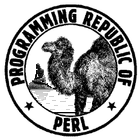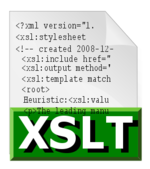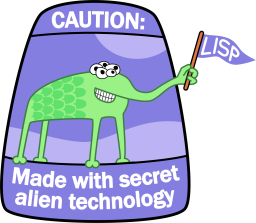(→Beiträge, die die Anforderungen erfüllen: logos fixen) |
(wo wir schonmal dabei sind) |
||
| Zeile 163: | Zeile 163: | ||
[[Bild:Lisplogo_warning_128.png]] | [[Bild:Lisplogo_warning_128.png]] | ||
[[Bild:perl_logo_mermaid.png]] | [[Bild:perl_logo_mermaid.png]] | ||
[[Bild:Bash-org.jpg|128px]] | |||
[[Bild:Xslt.png|150px]] | |||
|} | |} | ||
Version vom 10. Februar 2012, 18:44 Uhr
Wir sind die Flo, Widerstand ist zwecklos!
Beiträge, die die Anforderungen erfüllen
#!/usr/bin/env ruby
flo = [ "dividuum", "syb", "fiji", "flowhase", "florolf", "piratenflo" ]
# flos sind keine arrayss1!
for i in 0..flo.size-1
eval "flo#{i} = flo[#{i}]"
puts "flo#{i} == \"" + eval("flo#{i}") + "\""
end
Dieses Perl (*duck*) kann ja keiner lesen!1) Daher:
Dreckiges C:
#include <stdio.h>
#include <stdlib.h>
#include <errno.h>
#include <unistd.h>
const int flolen = 6;
static const char *flos[] = {"dividuum","syb","fiji","flowhase","florolf", "piratenflo"};
static const char *proghead = "#include <stdio.h>\nint main(void){\n";
static const char *progend = " return(0);\n}\n";
int main(void){
int i; FILE *o;
o=fopen("flo2.c","w");
fputs(proghead,o);
for(i=0;i<flolen;i++){
fprintf(o," char *flo%d = \"%s\";\n",i,flos[i]);
fprintf(o," printf(\"flo%%d ist %%s\\n\",%d,flo%d);\n",i,i); }
fputs(progend,o);
fclose(o);
system("/usr/bin/gcc -o flos flo2.c;./flos;rm -f flo2.c flos");
return 0;
}
Nu aber wirklich noch in Perl:
#!/usr/bin/perl
@flo = ( "dividuum", "syb", "fiji", "flowhase", "florolf", "piratenflo" );
for $i (0..$#flo) {
eval "\$flo$i = \$flo\[$i\]";
print "\$flo$i eq \"" . eval("\$flo$i") . "\"\n";
}
Perl:
#!/usr/bin/perl
@flo = ( "dividuum", "syb", "fiji", "flowhase", "florolf", "piratenflo" );
for $i (0..$#flo) {
${"flo$i"} = $flo[$i];
print "\$flo$i eq \"" . ${"flo$i"} . "\"\n";
}
PHP:
<?php
$flo = array( "dividuum", "syb", "fiji", "flowhase", "florolf", "piratenflo" );
foreach ($flo as $i => $x) {
${"flo$i"} = $flo[$i];
echo "\$flo$i = \"" . ${"flo$i"} . "\"\n";
}
?>
Gute alte Bash:
#!/bin/sh flo="dividuum syb fiji flowhase florolf piratenflo" n=0 for f in $flo do eval flo$n=$f echo -n "flo$n == " eval echo \$flo$n n=$(($n+1)) done
Realisiert in PHP, Lisp, Perl, XML, Bash und XSLT und immernoch kürzer als die C-Version:
<?php
$flo = array( "dividuum", "syb", "fiji", "flowhase", "florolf", "piratenflo" );
$l = fopen("flo.lisp", "w"); $p = fopen("flo.pl", "w");
fwrite($l, '(progn (format t "~a" "<flo>")');
fwrite($p,'
print <<EOF
<xsl:stylesheet version="1.0"
xmlns:xsl="http://www.w3.org/1999/XSL/Transform"
xmlns="http://www.w3.org/TR/xhtml1/strict">
<xsl:template match="/">');
for($i=0;$i<count($flo);$i++) {
fwrite($l, "(format t \"~a~a~a\" \"<flo$i>\" \"$flo[$i]\" \"</flo$i>\")");
fwrite($p, "flo$i == <xsl:value-of select=\"flo/flo$i\"/>\n");
}
fwrite($l, '(format t "~a" "</flo>"))');
fwrite($p,'
</xsl:template>
</xsl:stylesheet>
EOF'."\n");
fclose($l); fclose($p);
system("sbcl --noinform --load flo.lisp --eval '(quit)' > flo.xml");
system("perl flo.pl > flo.xslt");
system("xsltproc flo.xslt flo.xml | grep -v xml");
?>
|
Noch einmal in Ruby:
#!/usr/bin/env ruby
flo = [ "dividuum", "syb", "fiji", "flowhase", "florolf", "piratenflo" ]
# flos sind keine arrayss1!
flo.each_with_index do | f, i |
instance_variable_set "@flo#{i}", f
puts "flo#{i} = #{instance_variable_get "@flo#{i}"}"
end
'cause JavaScript rocks:
flo = new Array("dividuum", "syb", "fiji", "flowhase", "florolf", "piratenflo");
for (i in flo) {
eval("flo"+i+" = flo["+i+"]");
dump("flo"+i+" == "+eval("flo"+i)+"\n");
}
Wir moegen Lua:
#include <lua.h>
#include <lualib.h>
#include <lauxlib.h>
lua_State *L;
char *flos[] = {"dividuum", "syb", "fiji", "flowhase", "florolf", "piratenflo"};
char buf[1024];
void main() {
char *p;
int i;
L = luaL_newstate();
luaL_openlibs(L);
for(i=0; i < 6; i++) {
sprintf(buf, "flo%d", i);
lua_pushstring(L, flos[i]);
lua_setglobal(L, buf);
}
p=buf;
for(i=0; i < 6; i++)
p += sprintf(p, "print(\"flo%d = \" .. flo%d);", i, i);
luaL_dostring(L, buf);
}
C++11:
#include <vector>
#include <string>
#include <cstdlib>
#include <fstream>
using namespace std;
int main(){
vector<string> flo={"dividuum", "syb", "fiji", "flowhase", "florolf", "piratenflo"};
ofstream cpp_2("cpp_2.cpp");
cpp_2<<"#include <iostream>\n#include <string> \nusing namespace std;\nint main(){\n";
for(int i=0;i<flo.size();++i){
cpp_2<<"\tstring flo"<<i<<" =\""<<flo[i]<<"\";\n";
}
cpp_2<<"\tcout\n";
for(int i=0;i<flo.size();++i){
cpp_2<<"\t\t<<flo"<<i;
if(i+1==flo.size()){
cpp_2<<"<<endl;\n";
}
else{
cpp_2<<"<<\", \"\n";
}
}
cpp_2<<"}"<<endl;
cpp_2.close();
system("g++ cpp_2.cpp -o cpp_2; ./cpp_2");
return 0;
}
Bloatiger Angebercode, der auch noch etwas völlig anderes macht
Und nochmal das, was das Ruby-Programm "mit viel bloatigem Metaprogramming-Foo" macht, allerdings wiederum in Common Lisp gegossen:
(Warnung: (Zumindest) als Lispprogramm ist dieses Beispiel ziemlich unsinning, und z.B. die PRINT-OBJECT-Methode widerspricht der gängigen Konvention.)
Ru^W Objektorientiertes C
// Das aendern:
#include "/usr/local/lib/ruby/1.8/i386-freebsd5/ruby.h"
VALUE flo_init(VALUE self)
{
char *flo[] = {"dividuum", "syb", "fiji", "flowhase", "florolf", "piratenflo"};
int i;
for(i = 0; i < 6; i++)
{
char varname[7];
sprintf(varname, "@flo%i", i); // Insecure!
rb_iv_set(self, varname, rb_str_new2(flo[i]));
}
}
VALUE flo_each(VALUE self)
{
int i;
VALUE vars = rb_funcall(self, rb_intern("instance_variables"), 0);
VALUE varname = rb_ary_shift(vars);
while(varname != Qnil)
{
rb_yield(rb_ary_new3(2, varname, rb_iv_get(self, RSTRING(varname)->ptr)));
varname = rb_ary_shift(vars);
}
return(Qnil);
}
int main()
{
VALUE flo;
ruby_init();
flo = rb_define_class("Flo", rb_cObject);
rb_define_method(flo, "initialize", flo_init, 0);
rb_define_method(flo, "each", flo_each, 0);
rb_eval_string("Flo.new.each { |name,value| puts \"#{name.gsub(/^@/, '')} = #{value}\" }");
return(0);
}
Fußnoten
1) Anmerkung zu: "Dieses Perl (*duck*) kann ja keiner lesen!"
Stimmt doch gar nicht! Ist ganz einfach:
map printf("%s = %s\n", [flo0..flo5]->[$_], [dividuum, syb, fiji, flowhase, florolf, piratenflo]->[$_]), 0..$#{@{[flo0..flo5]}};
(Kommentar von mgr: Genau, "0..$#{@{[flo0..flo5]}}" ... q.e.d. Danke für das gute Beispiel. Aber ernsthaft, es ging hier eben gerade *nicht* um Einzeiler, die will niemand.)
Und auch in python kann man Einzeiler schreiben:
print "\n".join(["%s = %s" % (k, v) for k, v in {"flo0":"dividuum", "flo1":"syb", "flo2":"fiji", "flo3":"flowhase","flo4":"florolf", "flo5":"piratenflo"}.items()])





